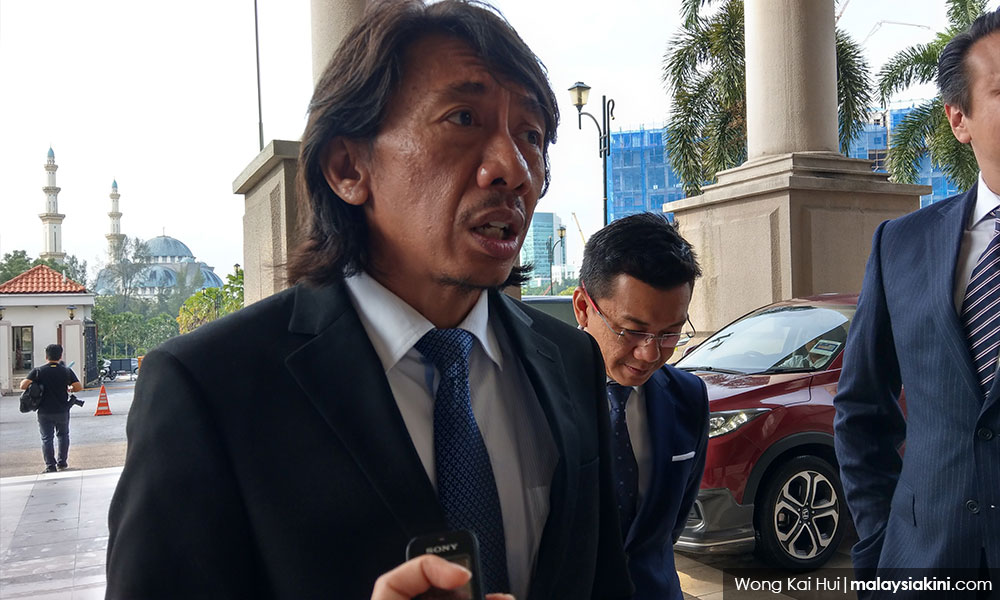The Parliamentary Select Committee on the proposed anti-hopping law only has two meetings left before it has to make recommendations on the draft legislation, committee member Wilfred Madius Tangau said.
As such, Madius (above) said he is in favour of not overly complicating the matters and focusing only on presenting basic anti-hopping draft legislation, and not being burdened by other matters like constituency funding and recall elections.
“The toughest part that we are going through is this dichotomy of whether these will be pro-voters or pro-political parties.
“There are other issues we have to consider, things like expulsion from the party and whether this constitutes (party) hopping, for example. This is a challenge that the committee is going through.
“There are views that there should be an exclusion (for expulsion) but if you qualify it (in the law), it would be bigger and bigger.
“We should be as simple and as uncomplicated as possible, like how Singapore and India do it,” he said at a conference on the matter by the Bar Council today.
Madius said the committee is also grappling with how to amend Article 10 of the Federal Constitution, which deals with freedom of association, and has been used to declare state legislation against party-hopping unconstitutional.
It must resolve this issue in its last two meetings on May 12 and 23, he added.
Madius said this in response to panellists, political scientist Wong Chin Huat and lawyer Amer Hamzah’s suggestion that the committee should also look into the causes of party hopping, instead of just legislating the symptom.
‘Package deal’
Wong said this would include proposing legislation on constituency funding and restrictions on the size of cabinet members and members who receive funds from the state through positions in state agencies because these have been identified as reasons for party hopping.

“We need to have a package deal. I think Madius and his colleagues should consider adding the recommendations, even if they will not go into details.
"They should include in the report that there are views that a package deal is needed on this, so either this committee or another committee can be set up to pursue this agenda,” Wong said.
Other proposed expansions to the bill include adding provisions for recall elections.
Singapore enshrines anti-hopping law in its Federal Constitution where a seat is deemed automatically vacant if a member is expelled or resigns from the political party for which he stood in an election.
Similarly, the law is enshrined in the 10th Schedule of the Indian Constitution, whereby a member can be disqualified for voluntarily leaving their party or for voting against the party’s wishes.
Why Article 10 needs amendment
In Malaysia, previous attempts by state governments to enact anti-hopping laws were snagged by Article 10 of the Federal Constitution.
Speaking on the same panel, Amer said the view that Article 10 must be amended comes from a 1992 case where the Supreme Court ruled that Kelantan’s anti-hopping law infringes on Article 10.
The court said this is because an elected representative could not switch parties without facing the consequence of losing his or her seat, making the freedom of association guaranteed by Article 10 ineffective and illusory.
However, he noted, the judgment was based on an Indian decision in the case of Mian Bashir, where the bench was split 2:2, with the acting chief justice’s decision on the matter making up the majority view.
In the majority view, the court found there is a need to curb switching parties for political gain, as was the practice in India at the time.
In the Nordin Salleh case, Amer noted, the Malaysian Supreme Court chose the minority view in the Indian decision, because it was of the view that this was not the case in Malaysia.

This scenario has changed post-2018, the lawyer added, where horse-trading happened as soon as election results were announced.
“If the Supreme Court had this information about Malaysia (post-2018), it would have adopted a majority decision in Mian Bashir and upheld the Kelantan constitutional amendment,” he said.
That said, he argued, the Nordin Salleh case is a valid law, and it would be wise for lawmakers to tackle this hurdle of Article 10 if it wants a law to withstand scrutiny in the courts.
Protecting liberties, empowering states
Further, Amer said, the amendment should be done carefully so as to not infringe on existing freedoms.
“The last thing we want is to get caught in a situation we can’t undo in the future, where there can be abuse and restriction of fundamental liberty.
“We have seen laws which infringe on our rights, like the Police Act, where a gathering of more than five people required a police permit (before the advent of the Peaceful Assembly Act).
“If we don’t tread carefully, there might be more laws which undermine our freedoms. If minimal amendments (to the constitution), but a working amendment, can be done, then let’s adopt that approach,” he said.
A bi-partisan PSC is deliberating proposed amendments to Article 10(3A) of the Federal Constitution and the anti-hopping law.
The PSC was formed after a vote on the constitutional amendment was delayed following a marathon debate on the bill by 59 parliamentarians.
Among others, critics said the anti-hopping bill tabled gave too wide powers to party leaders in intra-party rivalry, as they can automatically cause an MP to lose his or her seat by expulsion from the party.
The 11-member PSC must by the end of the month:
Refine what constitutes restricting MPs from switching parties and codify it in the Federal Constitution;
Study proposals to abolish Article 48(6) of the Federal Constitution, which deals with disqualification of members of Parliament, and other necessary constitutional amendments; and
Prepare a statement which will contain proposals on the bill restricting MPs from switching parties - Mkini




No comments:
Post a Comment
Note: Only a member of this blog may post a comment.